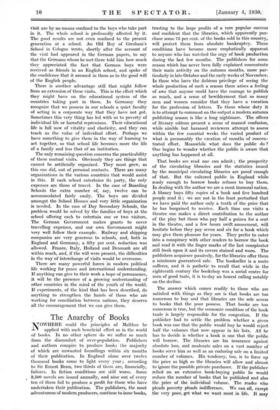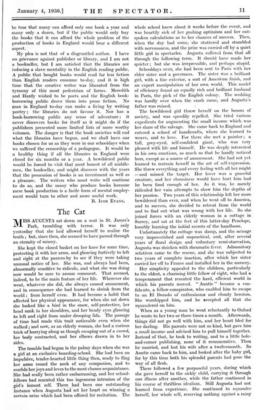• The Anarchy of Books
TO WHERE could the principles of Malthus be -LI applied with such beneficial effect as in the world of books. In no other sphere do we suffer so much from the discomfort of over-population. Publishers and authors conspire to produce books the majority of which are unwanted foundlings within six months of their publication. In England alone over twelve thousand books come to light every year ; according to Sir Ernest Benn, two thirds of them are, financially, failures. In fiction conditions are still worse. Some 8,500 novels are issued annually, and nine out of every ten of them fail to produce a profit, for those who have undertaken their publication. The publishers, the most adventurous of modern producers, continue to issue books, trusting to the large profits of a rare popular success and confident that the libraries, which apparently pur- chase some 75 per cent. of the books sold in this country, will protect them from absolute bankruptcy. These conditions have become more emphatically apparent to anyone who has watched the orgy. of book production during the last few months. The publishers for some reason which has never been fully explained concentrate their main activity on the autumn months, more par- ticularly in late October and the early weeks of November: In those who have the dubious privilege of seeing the whole production of such a season there arises a feeling of awe that anyone could have the courage to publish so much, and a sense of bewilderment that so many men and women consider that they have a vocation for the profession of letters. To those whose duty it- is to attempt to comment on the output a modern autumn publishing season is like a long nightmare. The offices of literary editors present a scene of massed confusion, while nimble but harassed reviewers attempt to assess within the few essential weeks the varied product of what is presumably the creation of months of concen- trated effort. Meanwhile what does the public do ? One begins to wonder whether the public is aware that anything has happened at all.
That books are read one can admit ; the prosperity of the circulating libraries and the statistics issued by the municipal circulating libraries are proof enough of that. But the cultured public in England while ready enough to borrow books refuses to buy them. In dealing with the author we are a most immoral nation. A library buys fifty copies of a book and five hundred people read it ; we are not in the least perturbed that we have paid the author only a tenth of the price that he has bargained to receive. Each time one visits a theatre one makes a direct contribution to the author of the play but those who pay half a guinea for a seat in the theatre, and a few hours swift amusement, will hesitate before they pay seven and six for a book which may give them pleasure for years. They prefer to enter into a conspiracy with other readers to borrow the book and read it with the finger marks of the last conspirator still fresh upon it and its covers stained and worn. The publishers acquiesce passively, for the libraries offer them a minimum guaranteed sale. The bookseller is a mute sufferer, and it is pathetic to recall that while in the eighteenth century the bookshop was a social centre for men of good taste, it is to-day an honest calling notably on the decline.
The answer which comes readily to those who are satisfied with things as they are is that books are too numerous to buy and that libraries are the sole access to books that the poor possess. That books are too numerous is true, but the economic condition of the book trade is largely responsible for the congestion. If the publisher had to settle the problem whether a given book was one that the public would buy he would reject half the volumes that now appear in his lists. All he has to decide is whether a book is one that the public will borrow. The libraries are his insurance against absolute loss, and moderate sales on a vast number of books serve him as well as an enduring sale on a limited number of volumes. His tendency, too, is to force up the price as high as the libraries will allow and almost to ignore the possible private purchaser. If the publisher relied on an extensive book-buying public he would reduce the number of books that he published and also the price of the individual volume. The reader who pleads poverty pleads indifference. We can all except the very poor, get what we want most in life.. It may be true that many can afford only one book a year and many only a dozen, but if the public would only buy the books that it can afford the whole problem of the production of books in England would bear a different aspect.
My plea is not that of a disgruntled author. I have no grievance against publisher or library, and I am not a bookseller, but I am satisfied that the libraries are inducing a slave mentality in the English reading public. A public that bought books would read• far less fiction than English readers consume to-day, and it is high time that the creative writer was liberated from the tyranny of this most pedestrian of forms. Meredith and Hardy wished to be poets and the English book- borrowing public drove them into prose fiction. No man in England to-day can make a living by writing poetry ; the libraries do not favour it. Nor has a book-borrowing public any sense of adventure ; it never discovers books for itself as it might do if the publishers presented more limited lists of more worthy Volumes. •The danger is that the book societies will end what the libraries have begun, and we shall have our books chosen for us as they were in our schooldays when we suffered the censorship of a. pedagogue. It would be a healthy thing if all the libraries in England were closed for six months or a year. A bewildered public would be forced to visit that most honest of all middle- men, the bookseller, and might discover with the years that the possession of books is an investment as well as a pleasure. The writers who must write will continue to do so, and the many who produce books because mere book production is a facile form of mental employ- ment would turn to other and more useful work.
B. IFOR EVANS.











































 Previous page
Previous page